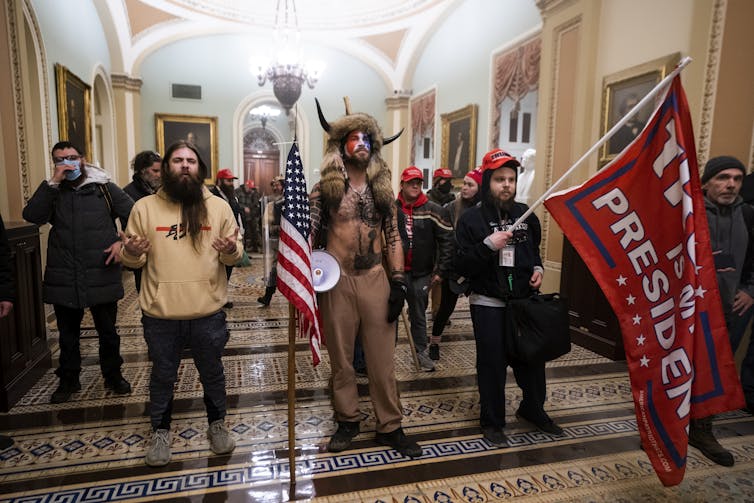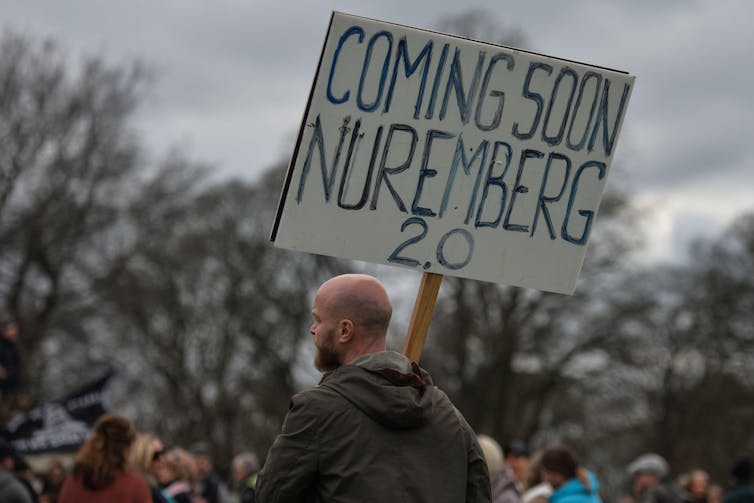Logically, authoritarianism and libertarianism are contradictory. Supporters of authoritarian leaders share a frame of mind during which they take course from an idealised figurehead and intently establish with the group which that chief represents. To be libertarian is to see the liberty of the person because the supreme precept of politics. It’s core to the economics and politics of neo-liberalism, in addition to to some bohemian counter-cultures.
As a frame of mind, libertarianism is superficially the alternative of authoritarianism. Identification with the chief or group is anathema and all types of authority are regarded with suspicion. As an alternative the best is to expertise oneself as a self-contained, free agent.
But there’s a historical past of those two outlooks being intertwined. Take into account Donald Trump, whose re-election in 2024 could be seen by many as including to the worldwide rise of authoritarianism.
Others would possibly see him as insufficiently centered to be an efficient authoritarian chief, nevertheless it’s not troublesome to think about him governing by govt order, and he has efficiently sought an authoritarian relationship together with his followers. He’s an object of idealisation and a supply of “reality” for the neighborhood of followers he purports to symbolize.
But on the identical time, in his rhetoric and his persona of predatory freewheeler, in his wealth and indifference to others, Trump provides a hyper-realisation of a sure sort of individualistic freedom.
Trumpism’s fusion of the authoritarian and the libertarian was embodied within the January 6 assault in Washington DC. The insurgents who stormed the Capitol that day passionately needed to put in Trump as an autocratic chief. He had not, in any case, received a democratic election.
However these individuals have been additionally conducting a carnivalesque assertion of their particular person rights, as they outlined them, to assault the American state. Amongst them have been followers of the weird conspiracy concept QAnon, who lionised Trump because the heroic authority determine secretly main the fightback towards a child-torturing cabal of elites.
Alongside them have been the Proud Boys, whose misty libertarianism is paired with a proto-authoritarian dedication to politics as violence.

EPA
New age meets anti-vax
Conspiracy theories are additionally concerned in different current examples of authoritarian-libertarian hybridity. Beliefs that COVID-19 vaccines (or lockdowns, or the virus itself) have been makes an attempt by a malevolent energy to assault or management us have been fuelled by a rising military of conspiracists. However they have been additionally facilitated by libertarian ideologies which rationalise suspicion of and antipathy in the direction of authority of all types – and assist refusals to adjust to public well being measures.
Within the UK, some small cities and rural areas have seen an inflow of individuals concerned in quite a lot of pursuits – arts and crafts, different drugs and different “wellness” practices, spirituality and mysticism. Analysis is missing however a current BBC investigation within the English city of Totnes confirmed how this may create a robust “different” ethos during which comfortable, hippie-ish types of libertarianism are outstanding – and really hospitable to conspiracism.
One might need thought that Totnes and another cities like it could be the final locations we’d discover sympathy for authoritarian politics. Nonetheless, the BBC investigation confirmed that though there could also be no single dominant chief at work, new age anti-authority sentiments can morph into intolerance and hard-edged calls for for retribution towards the individuals seen as orchestrating vaccinations and lockdowns.
That is mirrored in some COVID conspiracists calling for many who led the general public well being response to be tried at “Nuremberg 2.0”, a particular courtroom the place they need to face the dying penalty.
Once we do not forget that a virulent sense of grievance towards an enemy or oppressor who have to be punished is a daily function of authoritarian tradition, we begin to see how the dividing traces between the libertarian mindset and the authoritarian perspective have blurred round COVID.
Learn extra:
Conspiracy theories concerning the pandemic are spreading offline in addition to by social media
A disturbing survey performed earlier this yr for King’s Faculty London even discovered that 23% of the pattern could be ready to take to the streets in assist of a “deep state” conspiracy concept. And of that group, 60% believed the usage of violence within the identify of such a motion could be justified.

Alamy/NurPhoto SRL
Two responses to the identical anxiousness
A psychological strategy may help us to grasp the dynamics of this puzzling fusion. As Erich Fromm and others have proven, our ideological affinities are linked to unconscious buildings of feeling.
At this degree, authoritarianism and libertarianism are the interchangeable merchandise of the identical underlying psychological problem: the vulnerability of the fashionable self.
Authoritarian political actions provide a way of belonging to a collective, and of being protected by its robust chief. This can be utterly illusory, nevertheless it nonetheless offers a way of security in a world of threatening change and threat. As people, we’re weak to feeling powerless and deserted. As a bunch, we’re protected.
Libertarianism, in distinction, proceeds from the phantasm that as people we’re basically self-sufficient. We’re impartial of others and don’t want safety from authorities. This fantasy of freedom, just like the authoritarian fantasy of the best chief, additionally generates a way of invulnerability for many who consider in it.
Each outlooks serve to guard towards the doubtless overwhelming sense of being in a society on which we rely however which we really feel we can not belief. Whereas politically divergent, they’re psychologically equal. Each are methods for the weak self to keep off existential anxieties. There may be due to this fact a sort of belt-and-braces logic in toggling between them and even occupying each positions concurrently.
In any particular context, authoritarianism is extra more likely to have the required focus and organisation to prevail. However its hybrid fusion with libertarianism can have broadened its assist base by seducing individuals with anti-authority impulses.
And as issues at the moment stand, we’re vulnerable to seeing rising polarisation between, on one hand, this anxiety-driven, defensive type of mixed politics, and on the opposite, efforts to protect reality-based, non-defensive modes of political discourse.




